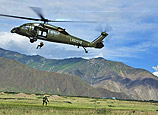
BANDAR SERI BEGAWAN, July 1 (Xinhua) -- A juxtaposition of the bilateral and the multilateral on settling disputes over the South China Sea is adding to the challenges of handling the issue, scholars said.
"The bilateral side, the multilateral side, as well as the interference of major powers from outside the region, have led to a situation that is much more complex than it was years ago," said Dr. Hui-Yi Katherine Tseng, a scholar in international law at the East Asian Institute, the National University of Singapore.
On the multilateral side, China and the Association of Southeast Asian Nations (ASEAN) said after a foreign ministers' meeting in Brunei on Sunday that they have agreed to hold meetings of senior officials in September in China on the full and effective implementation of the Declaration on the Conduct of Parties in the South china Sea (DOC).
The declaration is a key document signed by China and its ASEAN neighbors in 2002 to outline some of the most important principles in the management of disputes on the South China Sea.
While some of the competing claims are held by China and its Southeast Asian neighbors, the document is also believed to be able to help the ASEAN member nations manage differences among themselves.
China and ASEAN also agreed to "have the official consultations on the code of conduct (COC) on the South China Sea within the framework of the implementation of the DOC," they said in a joint press release.
Also going on at the three-day foreign ministers' meetings are bilateral diplomatic efforts to push forward regional cooperation, as foreign ministers of major powers such as China, Japan, the United States, Russia as well as the European Union took part in the meetings, too.
The Philippines also released a prepared press release, alleging "concern over China's military buildup" on the South China Sea, despite its joint military exercise with the United States launched at the same time when the ASEAN foreign ministers meetings were held.
But the obvious attempt to force its bilateral dispute onto a multilateral platform had no support from its neighbors.
Singapore's Foreign Minister K. Shanmugam said that the non- claimant states are not to get involved in the disputes over the competing sovereign claims.
"The specific claims - who owns what, whether it's the Philippines, China, Vietnam, Malaysia, Brunei - are not something that non-claimant states like Singapore can get involved," he told reporters.
What ASEAN wants is for the competing sovereign claims to be dealt with in a peaceful manner and in accordance with international law.
"The ASEAN nations want to talk with China on a multilateral basis on the management of the disputes. As for the (essentially bilateral) sovereign disputes, it is impossible for the ASEAN nations as a whole to have a position," said Dr. Lee Mingjiang, an assistant professor in international relations at the Nanyang Technological University.
The ASEAN joint communique only voiced its appreciation of the exchange of views and reiterated its support for the importance of key documents including the DOC.
While it is necessary to push for a legally binding code of conduct on the South China Sea, people should not expect such a document to make all the problems go at once.
"Even if they do have a legally binding code of conduct on the South China Sea in the coming years, it is still a question whether it can be practically effective. There can still be practices of non-compliance by the claimant states citing technical reasons," he said.
Chinese and ASEAN foreign ministers at the meetings in Brunei reiterated "the need to steadily move towards the conclusion of a COC on the basis of consensus."
Chinese Foreign Minister Wang Yi said that China is willing to work together with the ASEAN nations to push forward the process of developing a code of conduct from the declaration.
"The commitment to developing a COC is part of the DOC. This is a continual, gradual and deepening process. You can't separate them from each other," he said. "You can't have a COC without a DOC."
China said that the differences on the South China Sea are an issue between China and other claimant states directly involved, but not an issue between China and the whole ASEAN.
"It should not, and will not, have a substantial impact on the overall relationship between us," Wang said.
China has adopted a practical way of handling the disputes on the South China Sea, saying that it will "continually push forward the process from the declaration to the code of conduct and, in the process, brush aside the distractions from various sides."
China emphasizes the importance of self-restraint on all sides by implementing the DOC in order to pave the way for negotiations on a code of conduct.
"China thinks it is one of the few that has fully honored its commitments under the DOC. Actually if you look at it carefully, it is true that very few of the disputes were initiated by China, despite the criticisms," Tseng said.
It is a consensus in the academia and part of the diplomatic community that one should not expect the South China Sea disputes to be resolved completely any time soon.
Singapore's foreign minister said that the discussions between the foreign ministers of China and ASEAN were constructive, but " it does not mean that the problems are gonna go away or get settled next year, or the year after."
"No such thing," Shanmugam said. "But there has been some progress."
On the bilateral front, eventually all the claimant states will have to go back to exercising restraint on the South China Sea if they want peace and stability, Lee said.
The worship of absolute sovereignty should be questioned under certain circumstances in a world that is increasingly interconnected, and the idea of shelving the differences and going for joint development advocated by China should be respected, Tseng said.
















 Taiwan's average temperature in June reaches record high
Taiwan's average temperature in June reaches record high


![]()
